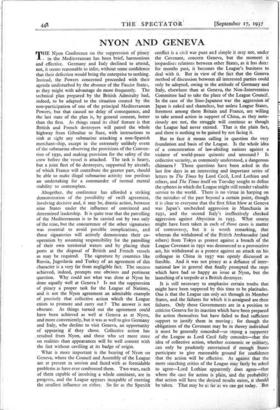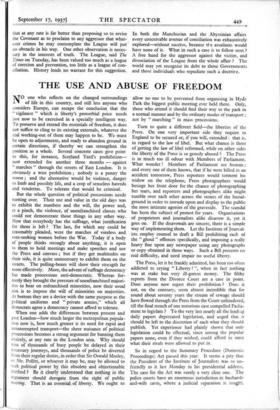NYON AND GENEVA .
THE Nyon Conference on the suppression • of piracy , in the Mediterranean has been brief, harmonious. and effective. Germany and Italy declined to attend,. not, it seems reasonable to infer, without some confidence. that their defection would bring the enterprise to nothing. Instead, the Powers concerned proceeded with their agenda undisturbed by the absence of the Fascist States, as they might with advantage do more frequently. The technical plan prepared by the British Admiralty had, indeed, to be adapted to the situation created by the non-participation of one of the principal Mediterranean Powers; but that caused no delay of consequence, and the kit state of the plan is, by general consent, better than the first. As things stand its chief feature is that British and French destroyers will patrol the whole highway from Gibraltar to Suez, with instructions to sink at sight any submarine attacking a non-Spanish merchant-ship, except in the extremely unlikely event of the submarine observing the provisions of the Conven- tion of 1930, and making provision for the safety of the crew before the vessel is attacked. The task is heavy, but a joint fleet of 6o destroyers, supported by aircraft, of which France will contribute the greater part, should be able to make illegal submarine activity too perilous an undertaking for a commander of normal mental stability to contemplate.
Altogether, the conference has afforded a striking demonstration of the possibility of swift agreement, involving decisive and, it may be, drastic action, between nine States under the influence of convinced and determined leadership. It is quite true that the patrolling of the Mediterranean is to be carried out by two only of the nine, but the concurrence of the other signatories was essential to avoid possible complications, and those signatories will actively demonstrate their co- operation by assuming responsibility for the patrolling of their own territorial waters and by placing their ports at the disposal of British and French vessels as may be required. The signature by countries like Russia, Jugoslavia and Turkey of an agreement of this character is a very far from negligible fact. The success achieved, indeed, prompts one obvious and pertinent question. Why could not what was done at Nyon be done equally well at Geneva ? Is not the suppression of piracy a proper task for the League of Nations, and is not the Nyon agreement an admirable example of precisely that collective action which the League exists to promote and carry out ? The answer is not obscure. As things turned out the agreement could have been achieved as well at Geneva as at Nyon, and more conveniently, but it was as well to give Germany and Italy, who decline to visit Geneva, an opportunity of appearing if they chose. Collective action has resulted from Nyon, and those who set more store on realities than appearances will be well content with the fact without cavilling at its badge of origin.
What is more important is the bearing of Nyon on Geneva, where the Council and Assembly of the League are at present in session and faced with as formidable problems as have ever confronted them. Two wars, each of them capable of involving a whole continent, are in progress, and the League appears incapable of exerting the smallest influence on either. So far as the Spaniih conflict is a civil war pure ani simple it may not, under the Covenant, concern Geneva, but the moment it jeoPardises relations between other States, as it has don. for months past, it becomes the League's _business to deal with it. But in view of the fact that the Geneva method of discussion between all interested parties could only be adopted, owing to the attitude of Germany and Italy, elsewhere than at Geneva, the Non-Intervention Committee had to take the place of the League Council. In the case of the- Sino-Japanese war the aggression of Japan is naked and shameless; but unless League States, foremost among them Britain and France, are willing to take armed action in support of China, as they noto- riously are not, the struggle will continue as though the League had never existed. That is the plain fact, and there is nothing to be gained by not facing it.
But to face it means calling in question the very foundation and basis of the League. Is the whole idea of a concentration of law-abiding nations against a violator of world-peace - quixotic and unsound ? Is collective security, as commonly understood, a dangerous chimaera ? Those questions have been asked in the last few days in an interesting and important series of letters to The Times by Lord Cecil, Lord Lothian and others, and The Times itself on Tuesday sought to define the spheres in which the League might still render valuable service to the world. There is no virtue in harping on the mistakes of the past beyond a certain point, though it is clear to everyone that the first felon blow at Geneva was Japan's unchecked aggression in Manchuria in 1931, and the second Italy's ineffectively checked aggression against Abyssinia in 1935. What course might have been taken in each of those cases is matter of controversy, but it is worth remarking, that whereas the withdrawal of the British AmbassadOr (and others) from Tokyo as protest against a breach 'of the League Covenant in 1931 was denounced as a provocative act, his withdrawal as a, protest against an attack on his, colleague in China in 1937 was openly diScussed as feasible. And it was not piracy as a defiance of inter- national law in general that finally prompted the steps which have had so happy an issue at Nyon, but the launching of a torpedo at a British destroyer. .
It is still necessary to emphasise certain truths that might have been supposed by this time to be platitudes. One is that the League can only act through its Member States, and the failures for which it is arraigned are their failures. Only those Governments are in a position to criticise Geneva for its inaction which have been prepared for action' themselves but have failed to find sufficient support to justify them in moving ; for though the obligations of the Covenant may be in theory individual it must be generally conceded—so stvng a supporter of the League as Lord Cecil fully concedes—that the idea of collective action, whether. economic or military, can only be prudently entertained if enough States participate to give reasonable ground for confidence that the action will be effective. As against that the more searching critics of the League may fairly be asked to agree—Lord Lothian apparently does agree—that where the case for action is plain, and the probability that action will have the' desired results exists; it Should be taken. That may be as far as we can get today. But that at any rate is far better than proposing so to revise the Covenant as to proclaim to any aggressor that what- ever crimes he may contemplate the League will put no obstacle in his way. One other observation is neces- sary in the interests of truth. The League, said The Times on Tuesday, has been valued too much as a league of coercion and prevention, too little as a league of con- ciliation. History lends no warrant for this suggestion. In both the Manchurian and the Abyssinian affairs every conceivable avenue of conciliation was exhaustively explored—without success, because th e assailants would have none of it. What in such a case is to follow next ? A free hand for the aggressor against the victim, and dissociation of the League from the whole affair ? The world may yet recognise its debt to those Governments and those individuals who repudiate such a doctrine.











































 Previous page
Previous page